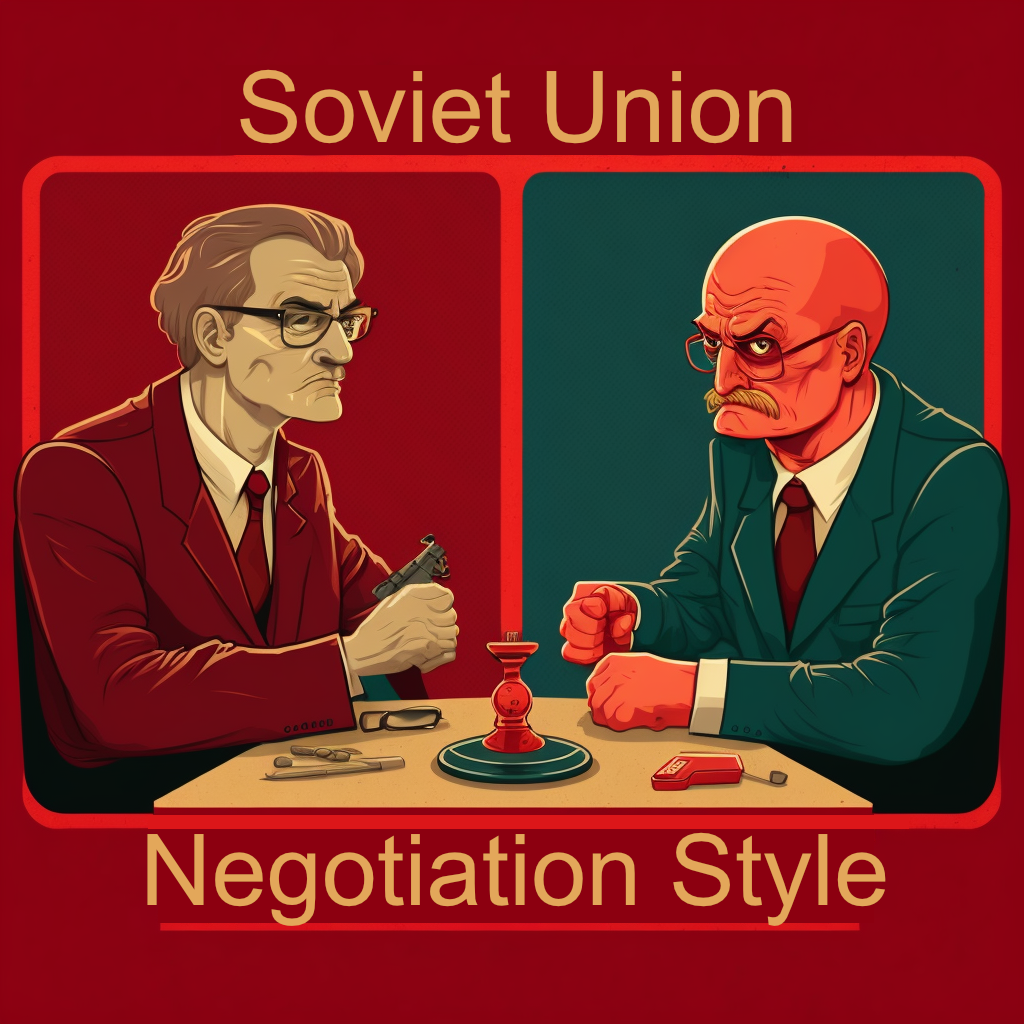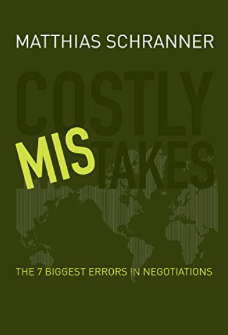How to negotiate like the Soviet Union

During the Cold War, the Soviet Union had a reputation for being a difficult negotiating partner. Some of the tactics they used in negotiations included:
- Brinkmanship: The Soviet Union would often push negotiations to the brink of a crisis, to gain an upper hand in the negotiations.
- Secrecy: The Soviet Union was known for keeping negotiations highly secretive, to prevent leaks and to maintain an element of surprise.
- Rigidity: The Soviet Union was often inflexible in negotiations, sticking to a set of predetermined positions and refusing to make concessions.
- Propaganda: The Soviet Union would regularly use propaganda to influence public opinion in their favor, to gain an advantage in negotiations.
- Use of intermediaries: The Soviet Union would frequently use intermediaries, such as other communist countries, to conduct negotiations or to relay messages to maintain deniability.
It's worth noting that these tactics are not unique to the Soviet Union, and have been used by many countries and political entities over time. Moreover, it should be considered that these tactics may not be effective in all situations and can backfire if the other party is aware of them.
Knowing this, let's look at a few ways to deal with such a rigid negotiation partner after defining what a negotiation is.
A negotiation is a process in which two or more parties discuss and attempt to reach an agreement on a conflict or set of issues. Negotiations can take place in a variety of settings, including business, politics, and personal relationships. The goal of a negotiation is typically to find a mutually acceptable solution that meets the needs and interests of all parties involved.
We engage in negotiations daily, both with ourselves and with others. We may negotiate with ourselves over what to do, or how to approach a situation. For example, we may negotiate with ourselves over whether to go to the gym or stay home, or whether to speak up or stay silent in a meeting.
Negotiations are an important part of daily life, as they help us to reach mutually beneficial agreements and to build trust and understanding with others.
Here are a few things you should do when negotiating with a party pretending to be the Soviet Union these days.
- Understand the Soviet perspective: Negotiating with the Soviet Union requires a profound understanding of their political ideology, history, and current goals.
- Be prepared: Negotiations with the Soviet Union require extensive research, planning, and preparation.
- Be patient: Soviet negotiations often move slowly, and it is important to be patient and not rush the process.
- Be flexible: Soviet negotiators are often inflexible, but it is important to be open to different options and to be willing to make concessions to reach a mutually beneficial agreement.
- Communicate effectively: Clear and effective communication is essential in negotiations with the Soviet Union, as misunderstandings can easily occur.
- Maintain control of emotions: Negotiations with the Soviet Union can be emotionally charged, but it is important to remain professional and maintain control of emotions.
- Be aware of cultural differences: The Soviet Union has a distinct culture, and it is important to understand and respect these cultural differences to be effective in negotiations.
- Be aware of propaganda: The Soviet Union often used propaganda to influence public opinion, so it is important to be aware of this tactic and not be swayed by it during negotiations.
- Use intermediaries wisely: The Soviet Union regularly used intermediaries to conduct negotiations or to relay messages, so it is important to use them wisely and not rely on them too heavily.
- Keep the big picture in mind: Keep the bigger picture and long-term consequences in mind when negotiating with the Soviet Union, as agreements made may have long-lasting ramifications.
Being too focused on winning can create a “win-lose” mindset, in which one party's gain is the other party's loss. This can lead to an adversarial relationship and can make it difficult for the parties to find a mutually beneficial solution.
Remember that negotiations are not about winning or losing, but about finding a solution that is beneficial for all parties involved. This requires a “win-win” mindset, where both parties can achieve their goals and interests.
A “win-win” mindset emphasizes the importance of cooperation, and helps to build trust and understanding between the parties.

Conflict avoidance, yielding and power (total-humiliation) can be undesirable states in negotiations as they can harm the long-term relationship or not resolve the conflict at all.
Conflict avoidance can be a problem because it may not address the underlying issues or concerns that are causing the conflict. By avoiding the conflict, the parties may miss an opportunity to find a mutually beneficial solution. Yielding, or giving in to the other party without making any effort to address your concerns, can also be problematic. It can lead to feelings of resentment and can create an imbalanced relationship, where one party has more power than the other.
Power (total-humiliation) is a strategy that seeks to dominate and defeat the other party. This approach can lead to the other party feeling humiliated, and can create a long-term negative relationship. This can make it difficult for the parties to work together in the future, and it can also lead to the other party becoming more determined not to give in.
A better approach is to address the conflict in a direct and open way, and to seek a mutually beneficial agreement that addresses the concerns and interests of all parties involved. This can be achieved through effective communication, compromise, and a willingness to find creative solutions.
Splitting the problem up into smaller parts can be an effective strategy to achieve a win-win outcome in negotiations, especially in difficult or complex situations.
By breaking the problem down into smaller parts, the parties can focus on specific issues or concerns and work on finding solutions for each one. This can help to identify areas of agreement and areas of disagreement, making it easier to find a compromise. Additionally, it can also help to prioritize the different issues, allowing the parties to focus on the most important issues first.
Splitting the problem up into smaller parts can also help to create a sense of progress and momentum during the negotiation process. This can help to build trust and goodwill between the parties, and can make it more likely that both parties will be satisfied with the outcome.
Splitting the task up into smaller parts is not a one-size-fits-all strategy, and it might not be appropriate for all negotiation situations. Assess the situation and use the most effective strategy, one size does not fit all.
Breaking the challenge into smaller parts strategy helps to make it appear as though the other party has “won” during the negotiation process. This can be accomplished by highlighting the benefits that the other party will gain from the agreement, or by emphasizing the aspects of the agreement that are most important to the other party. This can help to build trust and goodwill, and can make the other party more likely to agree to the proposed solution.
Do not use this strategy to mislead or deceive the other party. It should be used as a way to show that the agreement is fair and equitable, and that both parties will benefit from it. And make sure that the agreement is still beneficial to your interests as well. When both parties feel like they have “won” in the negotiations, it increases the chances of a long-term and sustainable agreement.
Keep in mind that this strategy should not be used at the expense of your interests and goals, it should be a way to reach a win-win outcome.
NO-GOs
Things to never do in a negotiation

Never focus on the past. As an example, if you try to negotiate for a higher salary by pointing out how hardworking you were in the last year, then you won't go far with it. Your boss is likely to tell you that you were paid for this time and did what was expected. Don't try, it's the first NO-GO on this list. Most likely you were compensated well for your efforts and if you were not, then that's your problem. You should have negotiated before, not after.
The past is gone, there is no changing it, focus on the future instead.
It is generally not advisable to focus on the past during negotiations. This is because dwelling on past events can create feelings of resentment and can make it difficult for the parties to move forward and find a mutually beneficial solution.
Never make comparisons. As an example, bringing up your coworkers' salary during salary negations do you no good. Comparing your salary to a coworker during a salary negotiation may not be the best approach for several reasons:
- It can create tension: Comparing your salary to a coworker can create tension within the workplace, as it can create feelings of resentment or jealousy among coworkers.
- It may not be relevant: The salary of a coworker may not be relevant to your salary negotiation. The other person's salary may have been negotiated under different circumstances, with different qualifications, or with a different job role and responsibilities.
- It may not be accurate: Information about the salary of a coworker may not be accurate or reliable. You may not know the full details of their salary and benefits package, and you may be basing your negotiation on incomplete information.
- It can make you look bad: Comparing your salary to a coworker can make you appear unprofessional or as if you are not fully committed to the job.
It's better to focus on your qualifications, experience, and job performance during a salary negotiation.
Likewise, it's also important to research and know the going rate for your position and industry, and to present your arguments in a professional and objective manner.
Never use commonplace argument, such as products getting pricier or the inflation going up. Our economics are based on an increasing inflation rate, so it's no surprise that this happens, and it is not worth alluding to it. Using the inflation rate as a means to get a higher salary may not be the most effective approach for several reasons:
- It may not be relevant: The inflation rate is a general economic indicator that may not be directly relevant to your specific job or industry. Your employer may have different financial considerations that are not directly tied to the inflation rate.
- Your employer may not see it as a priority: Employers may not see salary increases tied to the inflation rate as a priority, especially if they are facing financial constraints or other challenges.
- It may not be fair: Using the inflation rate as a means to get a higher salary can create the perception that you are only interested in a salary increase, not in the long-term benefits of the company.
- It doesn't consider the company's performance: The inflation rate doesn't consider the company's performance, it's a general indicator, so it doesn't reflect the company's current situation.
Again, focus on your qualifications, experience, and job performance during a salary negotiation. It's also important to research and know the going rate for your position and industry, and to present your arguments in a professional and objective manner. Make sure to work into conversation your future contributions to the company and how it will help them to achieve their goals.
Never thread or extort. To threaten with quitting the job if you don't get a raise or promotion is a quick way to get fired.
Threatening or extorting in a negotiation is not an effective approach because it can lead to a breakdown in communication and a failure to reach an agreement. Threats and extortion can create a negative and hostile environment, which can make it difficult for the parties to find a mutually beneficial solution. Additionally, threats and extortion can create a sense of mistrust and can make it difficult to build a positive, long-term relationship.
Threatening to walk away from a negotiation or to take legal action can make the other party less likely to compromise or to find a mutually beneficial solution. Similarly, extorting the other party by demanding something that is not fair or reasonable, can make the other party less willing to cooperate.
Negotiations are about finding a mutually beneficial agreement, and threats and extortion can make it difficult to achieve this goal.
The recommended approach during negotiations is to act in a respectful and professional manner, and to focus on finding a solution that addresses the concerns and interests of all parties involved.
Making accusations during a negotiation can be counter-productive because it can create a defensive and hostile environment. It's an attack on your negotiation partner. Accusations can create a sense of mistrust and can make it difficult to build a positive, long-term relationship.
Accusations can also be seen as an attempt to blame or to shift responsibility for the problem or issue at hand.
This can make the other party less willing to cooperate or to take responsibility for their actions. It can also make the other party defensive and less willing to listen to your arguments.
Negotiations are about finding a mutually beneficial agreement, and accusations can make it difficult to achieve this goal. Approach negotiations in a respectful and professional manner, and focus on finding a solution that addresses the concerns and interests of all parties involved. Avoid personal attacks or to blame the other party, and try to stay focused on the problem or the issue at hand.
Let your negotation partner speark first
Set your ambition to be the first to listen
Using the increased stress or pressure of your negotiation partner at the beginning of the negotiation to understand your negotiation partner better. Aim at understanding the arguments of your negotiation partner. Mind that negotiations are a process of mutual exchange of information, ideas, and interests. Stress the other party may have should not be used to gain an advantage, but rather to understand the other party's perspective and find a mutually beneficial agreement.

Find common ground, stand on the same level, and clearly communicate how your arguments are in your partner's best interest.
True eloquence consists in saying all that should be said, and that only.

Approach negotiations with a problem-solving mindset and to focus on finding a solution that benefits both parties. If you want something, then the other person has to have a gain.
Your arguments articulate the gain for your negotiation partner.
Don't have more than three arguments, and always articulate the most important and strongest argument first. It's a for your position to bring the strongest argument first, as when this doesn't fly, you know it's over right away.
By starting with your strongest argument, you can create a sense of momentum and can also build credibility with the other party. Additionally, if the other party is not receptive to your strongest argument, then you can end the negotiation. At that point, you fully understand where you are at. And it's not a negotiation if you can't walk away from it in the first place.
It's important to keep in mind that having a limited number of arguments doesn't mean that you should be unprepared. It means that you should prioritize your arguments and focus on the most important and relevant ones.
When attacked, don't react
Don't react, don't let your emotions and instincts take over.
When attacked during a negotiation, it's important to remain calm and not react emotionally. Responding in kind to an attack can escalate the situation and make it more difficult to find a mutually beneficial solution. It can also undermine your credibility and make it harder for the other party to take you seriously. So keep it cool and do nothing.
... To be continued.
